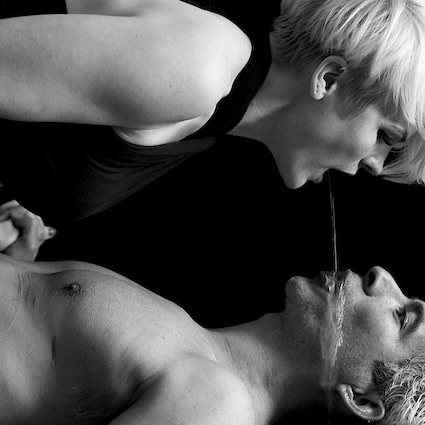
Poems are a series of videos that contemplate life as a couple in a crude way, which seeks to escape the jurisprudence of positivism, the religion of this age. The characters do not experience love as a simple consumer product, soft and delicate, they assume it as a reality that can also be “negative”. Their main interest in life is to transform themselves into someone they were not before, accepting that the bond between them (love) tacitly comes with vulnerability and the fear of being hurt by the other. Interpersonal relationships are worthwhile insofar as we do not know the end. The way we think and feel is often related to the social structures that surround us. We have become accustomed to certain utopian emotional landscapes that have become normal. A stroboscopic idea of perfection where reality loses ground. These videos show the arbitrariness of the institutions and their diagnoses that are transformed into sentences due to the lack of precision, but they also show spaces of freedom such as art and love, from where we can enjoy how many changes can be made. These videos are a political action, an act of rebellion to the norms of positivism.
Jhafis Quintero (Panama, 1973) lives and work in Europe Plastic artist and writer. Jhafis Quintero began his career as an artist while discounting 10 years in prison in Costa Rica, at the hands of the artist Haru Wells, who was determined to demonstrate that art is an effective substitute for crime. His prison experience plays a prominent role in his work, with a unique perception of the passage of time and its implications for a body immersed in that particular time frame, and a constant reflection on death that slides over the life of the interns. His artistic practice arises from his personal experiences in the prison world, silence, insecurity, but also imagination and creativity aimed at finding means of survival. He has had personal and group exhibitions in museums in New York, Texas, Madrid, London, Barcelona, Istanbul, Brazil, Argentina and Tazmania, among others, and his work is part of private collections such as Daros (Switzerland), Cisneros or the National Center of Fine Arts of Paris. He is the author of \’Máximas de seguridad\’,\’ \’Los dueños del mundo\’ y La Casa de los Geckos\’. Johanna barilier (b. 1986. Lausanne, Suisse) live and work in Suisse and latinoamerica She was born into a Swiss family in which the Christian religion had a predominant place. She has always opposed religious dogmas according to which a woman was nothing other than the servant of God and of man; As a child she became a thief, a liar and a seducer. She refused to be subdued by any system, including the school system. The medical system imposed reclusion on her, \”for her protection\” as an alternative, she was interned several times in psychiatric hospitals. She regularly escapes from these sites. Being a teenager of extreme sensitivity, a pathological sensitivity that according to doctors, could lead her to dangerous acts, self-harm and endanger her own life. According to the DSM, she fullfil the criteria for borderline personality disorder. According to the doctors, it would be difficult for her to have a job or a life considered normal. Also, the chances of dying before turning 30 were very high. Her life has been in effect a constant struggle against labels and manuals. The religious wanted to determine her life according to the Bible and the doctors according to the DSM (Medical Bible). For more than 10 years, she has worked in the social field. Interviewing people who suffer the labels of institutionalization (unemployed, immigrants, mental illness, etc.) It is in this context that her hypersensitivity becomes a wealth because she manages to establish horizontal communication with people. “Sometimes this hypersensitivity takes my whole being and puts me in danger. I tamed it, but I can\’t control her totally. My body is “marked” by this reality. My mental wounds have turned into physical wounds, the scars on my arms and legs have grown with me, like evidence thst my past was not just a dream. My entire body is a logbook “. “I have always practiced photography: When I capture an image, I feel like I am taking a step back from the situation. The previous convulsive and uncontrollable scene turns into a still image. A memory\”. The meeting with the artist Jhafis Quintero was explosive. A feeling of self-recognition at first glance, powerful but also destructive. During the confinement we found our respective conditions in a dangerous promiscuity, this powerful love caused deep couple crises that led me to the hospital, but also to police interventions. Today we are a couple \”under surveillance\”. Of the legal medical system and the police. I have found in art not only the way to evade the religious and medical dogmas with which i has had to live with, art it has also help me to tame my own demons. In our works, we show our pathological love, which is ultimately nothing more than an exacerbation of what everyone can experience. ARTIST’S WEBSITE

